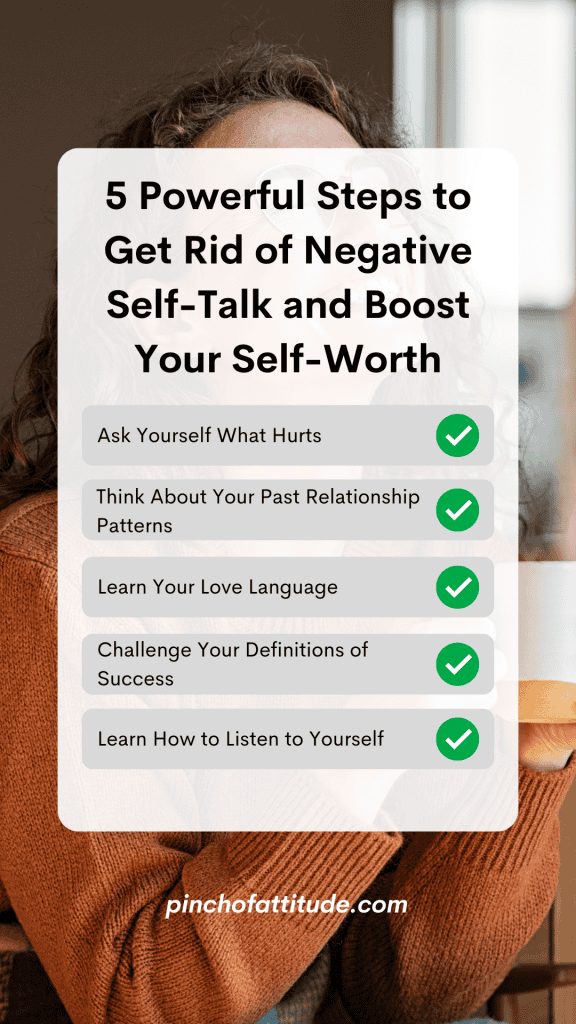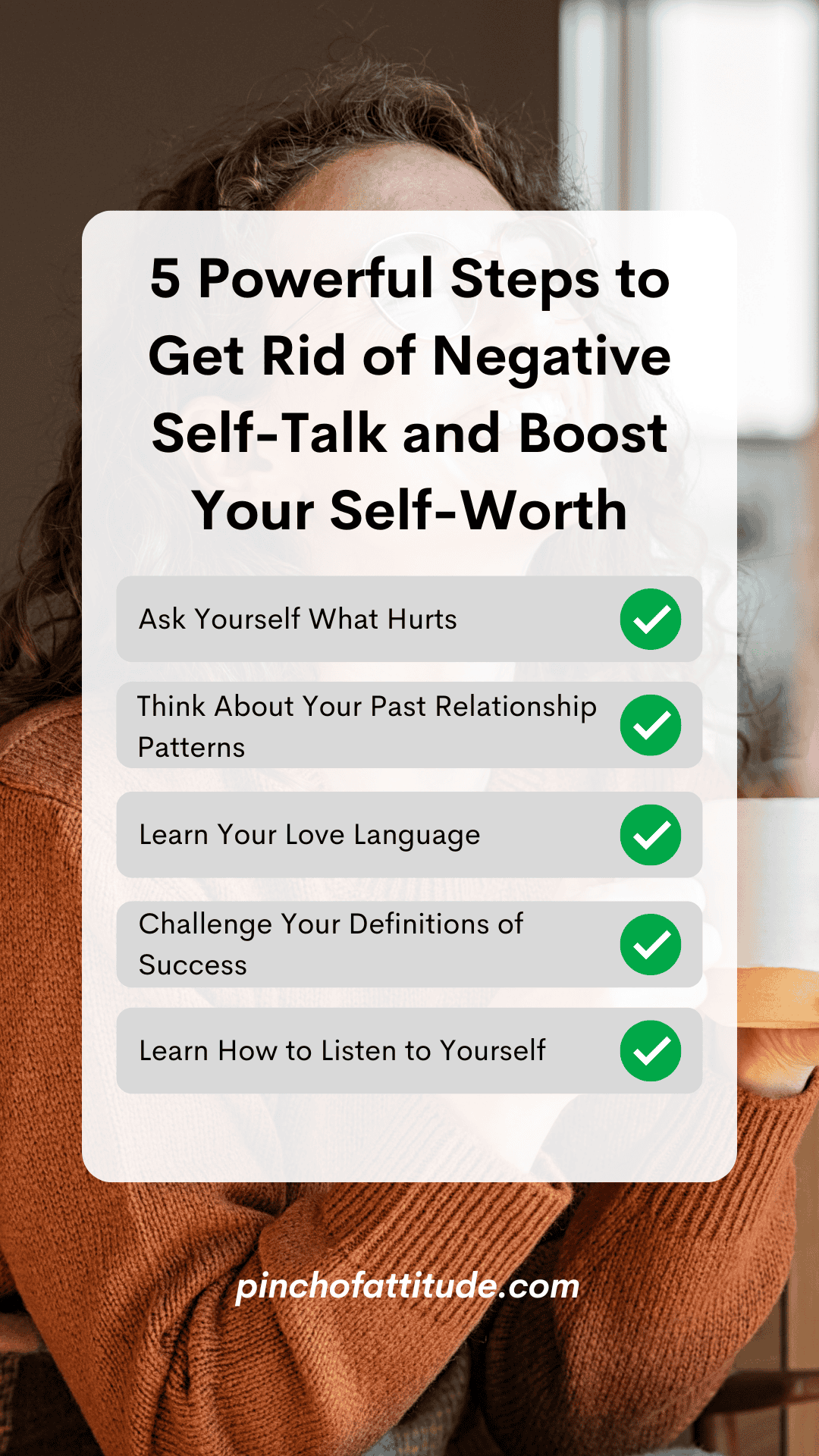Am I good enough? Take a moment to define that term. What makes a person “good enough”?
Is it having a thriving career with a lot of money in the bank? Is it being married, having a family or just being the best spouse or parent to ever exist?
You never lose your temper, you always find a solution to every problem (even ones that aren’t your own), and you always eat healthily, go to the gym, and have an amazing body. Is that all good enough?
Now, whatever your definition of “good enough,” is, what do you do when you get there? And how do you get there from where you are right now?
You’re not reading this because you think you’re amazing and have absolutely no room for improvement.
Chances are that you clicked on this because you feel like you aren’t good enough, and even on your best days, if someone could give you irrefutable confirmation that you are perfect, that you are “enough,” you’d take it in a heartbeat.
Table of Contents
Good Enough Doesn’t Exist

The idea of “enough” is fundamentally flawed. When you strive to be enough for anyone, that requires you to automatically assume that you are lacking. How much is enough? Is enough even whole? Is it 100 percent? 75 percent?
Before you can stop asking yourself the question “Am I good enough?”, you have to realize that thinking about being enough is the problem – not you.
Everything that you need is already inside of you, even if it hasn’t manifested yet.
We can’t believe that we aren’t good enough to change. You can’t believe that you are worthless, incapable, and inherently flawed and expect to somehow magically become a happy, complete person.
The idea of being good enough, and the notion that nothing we do ever adds up, is tied to our thoughts and inner voice.
The way we talk to ourselves – a term psychologists call “self-talk” – holds the secret to happiness and the ability to believe that we really are enough.
What Your Self-Talk Says About Your Self-Esteem

How you speak to yourself is a reflection of what you feel about who you are. So, constantly asking yourself “Am I good enough?” shows your level of insecurity.
I know it’s hard to believe but some of the most successful people who seemingly have it all together are actually riddled with low self-esteem.
People often chase external sources of achievement and power to convince themselves that they’re good enough.
There’s nothing wrong with being committed to your job or being passionate about your career, but there is a limit where ambition becomes more of a defense mechanism than a character trait.
Low self-esteem is complicated, and it often doesn’t look or feel like you imagine.
There are definitely instances where your inner voice will say, “You aren’t good enough,” or, “No one is ever going to love you.” These vicious comments aren’t uncommon, but they aren’t the only way your negative self-talk destroys your self-esteem.
Negative self-talk could tell you that it’s better to not go out of your way and work hard because the payoff isn’t that big anyway.
It may encourage you to cancel dinner plans with a friend because Netflix is so much better than a restaurant and crowd.
It might even suggest that going out and trying to meet new people is a complete waste of time, so you shouldn’t tire yourself out and just stay home in bed.
Over time, these thoughts become more demanding. You have to explain them to yourself, and the logic usually doesn’t wind up anywhere good. Not seeing your friends becomes justifiable because they aren’t your real friends anyway; they only talk to you because they think they have to.
Meeting new people is futile because no one ever connects with you; it’s like you’re invisible, and people who do get close always leave you in the end. It’s like you’re cursed or something.
We rob ourselves of happiness when we let negative self-talk tell us it’s better to be alone than let other people into our lives.
Negative self-talk convinces us that the outside world isn’t really made for people like us, that we’re outsiders who shouldn’t bother trying to connect and fit in because it will only wind up leaving us hurt, alone, or just pissed off.
Ask yourself how you really feel about who you are and try to avoid using any actions.
If you’re a good worker, why is that? Why are you a good spouse? A good child? A good friend? If all you can come up with are actions instead of feelings about your genuine character, then it’s time to check in with your self-image and begin to build healthier, more positive views.
Simply put, begin with stop asking yourself the toxic question “Am I good enough?”, because you are.
Unlearning Negative Self-Talk

I’ll be honest: When you first decide to hop on the love yourself bandwagon, you’re going to feel like a total fraud. Smiling at yourself in the mirror and repeating, “I love you,” isn’t going to suddenly heal every emotional wound and give you incredible self-esteem.
Self-talk, confidence, and self-love are all things that take time to develop, and you have to start by unlearning unhealthy habits.
Your inner voice has been shaped by experiences that go all the way back to childhood.
Being the victim of childhood bullying, having abusive or distant parents, or even being praised too much could have laid the groundwork for your self-talk.
A lot of people have a great childhood, but they grow up and get into the real world only to discover that everyone isn’t going to think they’re the best like their parents would tell them, and they don’t know what to do. They get their heartbroken. They lose friends. They don’t get a call back after a job interview. They thought they were smart. They thought they were always good enough. Were they wrong?
The first thing you have to do before you start to reshape your negative self-talk and stop asking yourself “Am I good enough?” question is to get personal with your feelings. Though it can be scary, trust me I know but stay with me.
Consider applying these five-step process of learning more about who you are, confronting your inner voice, and getting in touch with what it’s really trying to tell you.
Step 1: Ask Yourself What Hurts
Negative self-talk wears us down and keeps us stuck in the same place; I’ve used my own self-defeating thoughts as justification for bad feelings about myself.
It’s easy to avoid coming to terms with things that are painful or upsetting if you just think negatively about them instead.
A critical, aggressive, or pessimistic inner voice is really just a way of avoiding pain, even though that’s exactly what it stems from.
What is your negative self-talk really trying to tell you?
A thought like, “No one likes me,” or “I’ll never have any friends,” is really your brain’s way of alerting you to loneliness.
A lot of our deepest, most essential wants are rooted in fear because we feel so lost without them.
Not having a partner, which we’ve been taught to view as the utmost confirmation of love, can quickly cause us to think, “I’m unloveable” or “Am I good enough for anyone?”.
Step 2: Think About Your Past Relationship Patterns
Where does your negative self-talk come from? It may be convenient to just tell yourself being negative is just who you are, but that’s not the case.
You were a child once, a small, precious, and innocent being who believed that anything was possible. That innocence may have been tarnished and stolen at a much younger age than some.
Abusive households and children who grow up in them often lead to destruction, depression, and low self-esteem later in life.
Think back to your family growing up; did you live in a functional household where people were kind, respectful, and accepting of others’ feelings, or did you constantly feel the need to defend your thoughts and opinions?
Maybe you had a parent who ruled with an iron fist and taught you that it was their way or the highway. This type of parenting often causes people to become extremely critical of themselves and others; negative self-talk can be shaped by everyone else’s opinions and standards.
I know what it feels like to be so out of touch with who you are that even your most personal thoughts feel like they belong to someone else.
It’s scary to admit that you don’t know what you want, who you are, or where to go from here.
But negative self-talk ultimately causes us to stay trapped in a painful cycle of looking to others for validation and approval. We get into relationships with people who reinforce our negative, self-defeating thoughts, and further conflict only perpetuates the cycle.
Step 3: Learn Your Love Language
How do you feel connected to others? There are five love languages that describe how people like to give and receive love.
Maybe you feel most valued when someone spends time with you, or perhaps your idea of love comes through physical touch. People need to know how they express and receive love so they can begin countering their negative self-talk with healthy, loving actions.
I’m pretty sure that you aren’t an entirely heartless, unloving person. You might even be married and treat your partner like the best creature to ever grace this planet. If that’s the case, how are you showing them love? How do you want and need to receive it?
Negative self-talk is isolating; it drives a wedge between you and the world, and ultimately, between you and yourself.
When we feel worthless, it’s easier to write off love as useless than it is to tell ourselves we just feel unlovable. But we all need love. You have to give yourself love before you can fully receive and give it to anyone else.
Step 4: Challenge Your Definitions of Success
When you think about what being “good enough” really means, what ideas come to mind? Think of a few standards you feel like you fall short of every day; then, it’s time to start unpacking them.
If you think that having a successful career is part of being a valuable human, where does the line stop? Is it when you earn a certain amount of money per year or hold a certain title?
The problem with so many ideas of success is that they’re rooted in external factors.
We look to the outside world for evidence that we’re worthy within. While that already sounds problematic, it gets worse. These external factors can easily be ripped away from us.
You could have your dream job and feel like you’re on top of the world only to get laid off tomorrow. Then what? Are you just suddenly not good enough again?
Success can be measured in many ways; goals and ambitions, standards, and personal values aren’t the problems here. The trouble arises when our ideas of success are heavily rooted in other people’s standards.
Your parents may have taught you that nothing is more important than getting good grades and making a lot of money. If that’s true, does that mean your entire life is meaningless until you land a six-figure salary?
The logic behind our standards of success is flawed because it implies we’re worthless until we achieve something.
How can you ever achieve greatness if you’re useless to begin with? In order to be “good enough,” you have to already be good in the first place.
Step 5: Learn How to Listen to Yourself

You may think this is the easiest step because all you do is listen to your brain’s nagging, negative thoughts. They’re impossible to ignore.
There have been times in my life when I would have given anything to just not think at all. Numbing our minds with alcohol, drugs, sex or food won’t ever lead to long-term fulfillment. The temporary happiness wears off and leaves a painful sting our inner voice eats right up.
You have to listen to what your negative self-talk is really trying to say; if what you hear when you look in the mirror is, “I’m so fat and ugly,” what is really going on?
You feel unattractive and, as a result, feel like being overweight means you aren’t worthy of people who appreciate, admire, and adore. That simply isn’t true.
If your inner voice tells you that trying to think positive is a joke and you can’t even do that right, maybe it’s really just your brain’s way of telling you that you’re scared.
It’s comfortable being negative. It’s easy to see the bad in everything. It takes time, patience, and determination to think positively and believe in your own capability.
So, asking yourself “Am I good enough?” is just an easy way out for you to not ask yourself the right questions to find who you truly are.
But once you receive love and acceptance from yourself, it’s incredible how brilliant even the simplest routines become.
I could once only imagine how liberating it must feel to go to the pool and wear a bathing suit without worrying about my gut or thighs. After months of working on myself and practicing body positivity, I was able to go to the pool and have a great time.
Positive self-talk isn’t all sunshine and rainbows.
You don’t have to slap on some rose-colored glasses and pretend everything is perfect.
You don’t need perfection to be “good enough.” You just need the desire to be happy and feel better. By that standard, just about everyone in the world qualifies.
Finding Your Real Inner Voice
Begin to get in touch with who you are by doing what you love.
Make a commitment to do the five things this weekend that you want to do. These shouldn’t be activities that you think you should do or someone else likes. Don’t look to Instagram or your friends or family for inspiration; just go with your gut.
If you want to draw, don’t let the negative voice that tells you that you’re talentless stop you from picking up a pencil. Even if you only manage to scribble a stickman on a dinner napkin, guess what?
You’ve defied your inner voice and taken life into your own hands.
Understanding yourself is a lifelong process; I’m not sure if there is ever a definitive point where a human being thinks, “Ha! That’s it! Job well done. I’m self-evolved now.” If that were the case, existing at all would be pretty boring.
Life is a journey, and we’re meant to stumble, fall and, sometimes, crawl through it. But that’s okay. As long as we know we’re good enough and stop thinking “am I good enough?” because again we all are good enough.
We always have our thoughts to guide us, and even when we can’t stop negative ones from emerging, we have the power to create positive ones, too.
Whenever you feel like your desire to change isn’t working, think, “I’ll just try one more time. I can do that.”
Just one more positive thought is a lot of positivity over a lifetime, isn’t it?
All you have to do is say one kind thing today and challenge yourself to do it again. It may take weeks, months or even years, but I promise that you are going to feel a change.
One day, you aren’t going to need a reminder to be kind to yourself. And that is more than enough.
Related Posts:
- 25 Clever Ways to Maintaining Positive Thoughts That No One Tells You
- Positive Words – Your Daily Practice To Create Self-Affirmation
- 50 Best Self-Help Books of All Time That Will Change Your Life
- Transform Yourself Through Positive Changes and Self-Awareness
- Good Thoughts on Life, You Are the Product of Your Own Thoughts




